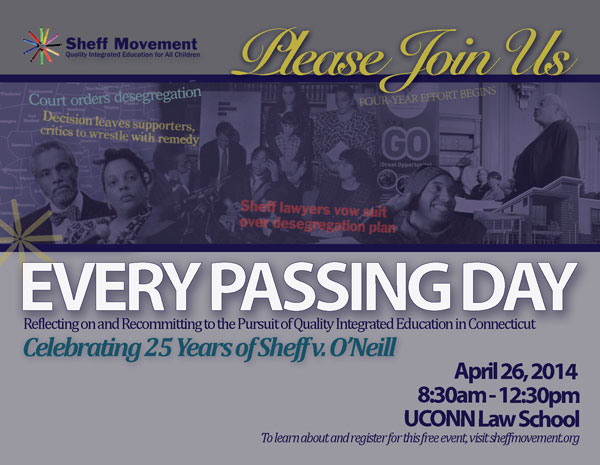

HARTFORD, CT – Trinity College received a grant for $1,250 from Connecticut Humanities to sponsor a “history harvest” at the 25th anniversary of the Sheff v. O’Neill struggle against segregated schools. In April 1989, Elizabeth Horton Sheff and nine other families filed a lawsuit against then-Gov. William O’Neill to provide equal educational opportunities for students in both city and suburban districts. The grant funds a public presentation and discussion of these events and helps Trinity students and faculty to record, preserve and share participants’ memories of this key chapter in Connecticut’s civil rights history.
City and suburban students, parents, educators and community members are invited to attend the Sheff 25th anniversary event on Saturday, April 26, from 8:30 a.m. to 12:30 p.m. at UConn Law School, Starr Hall, 55 Elizabeth St., in Hartford. The event is open to the public and begins with a breakfast buffet. Please RSVP at SheffMovement.org.
Guest panelists include lead plaintiffs Elizabeth and Milo Sheff, as well as veteran civil rights attorneys Dennis Parker, Martha Stone and Philip Tegeler. Karen Taylor (a Trinity adult student and Hartford parent) will present the “history harvest” model and invite audience members to share their memories in the oral history video recording rooms. Pedro Bermudez (a Hartford filmmaker and one of the original Sheff plaintiffs) will launch a make-your-own-video contest for youth to tell their own stories about Sheff and public education. Also, audiences are encouraged to bring their personal photos and documents about Sheff and school integration, such as interdistrict magnet schools and the Open Choice program, to be digitally scanned at the event.
Trinity College Professor Jack Dougherty designed this “history harvest” with his students and the Sheff Movement planning committee, based on a model adapted from the University of Nebraska. “The school integration struggle has touched the lives of thousands of students, parents and teachers in the metropolitan Hartford region,” one of the most racially and economically segregated areas in the Northeast, explained Dougherty. “Our goal is to record people’s stories about Sheff, share them widely online and preserve them for future generations.” Contributors will be asked to grant permission for their oral histories, images and documents to be digitized and publicly distributed on the Internet through the Trinity College Digital Repository. Learn more about the process at http://bit.ly/sheff25years.